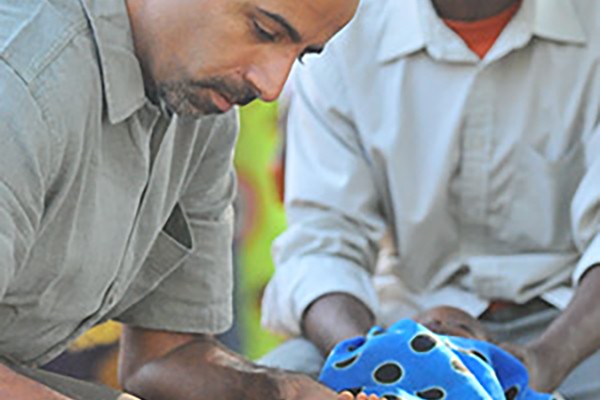Eating more like our ancestors would improve human health
Malnutrition problems can be traced to poor-quality diets lacking in diversity, a recent phenomenon in evolutionary history, according to a new paper from the Brown School at Washington University in St. Louis.
Gordon to receive Keio Medical Science Prize
Jeffrey I. Gordon, MD, the Dr. Robert J. Glaser Distinguished University Professor at Washington University School of Medicine in St. Louis, is a recipient of the 2015 Keio Medical Science Prize.
Manary awarded grant for research involving pregnant, malnourished teens in Malawi
Mark J. Manary, MD, of Washington University School of Medicine in St. Louis, has been awarded one of three research grants from the Sackler Institute for Nutrition Science at the New York Academy of Sciences.
New approach to childhood malnutrition may reduce relapses, deaths
Children treated for moderate acute malnutrition experience a high rate of relapse and even death in the year following treatment and recovery. A new study led by School of Medicine researchers has found that target weights and measures of arm circumference used in assessing the health of malnourished children are insufficient and that raising these thresholds could significantly lower the rate of relapse.
Washington People: Justin Serugo
After fleeing his war-torn homeland, the Democratic Republic of Congo, Justin Serugo was relocated to St. Louis, where he eventually landed a job at the School of Medicine. He now works on a childhood malnutrition project.
Dickson Prize awarded to medical scientist
Jeffrey I. Gordon, MD, has won the 2014 Dickson Prize in Medicine for his pioneering studies demonstrating how the tens of trillions of microbes that live in the gut influence human health.
Lingering problem found in gut microbe communities of malnourished children
New research from School of Medicine scientists may help explain why millions of malnourished children suffer from stunted growth and fail to thrive after treatment with nutrient-rich therapeutic foods.
Gordon wins Passano Foundation Award
Jeffrey I. Gordon, MD, director of the Center for Genome Sciences and Systems Biology, has won the 2014 Passano Foundation Award for his pioneering studies showing how the trillions of microbes that live in the gut influence human health.
Antibiotics cut death rates for malnourished kids
Severely malnourished children are far more likely to recover and survive when given antibiotics along with a therapeutic peanut-butter based food than children who are treated with the therapeutic food alone, researchers at Washington University School of Medicine in St. Louis have found. Indi Trehan, MD, the study’s lead author, shows parents in Malawi how to measure medication.
Gut microbes at root of severe malnutrition in kids
A study of young twins in Malawi, in sub-Saharan Africa, finds that bacteria living in the intestine are an underlying cause of a form of severe acute childhood malnutrition.
View More Stories


